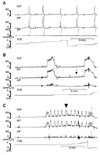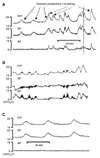1. Macfarlane GJ, Sagnier PP, Richard F, Teillac P, Botto H, Boyle P. Determinants of treatment-seeking behaviour for urinary symptoms in older men. Br J Urol. 1995. 76:714–718.
2. Knutson T, Edlund C, Fall M, Dahlstrand C. BPH with coexisting overactive bladder dysfunction-an everyday urological dilemma. Neurourol Urodyn. 2001. 20:237–247.
3. Im JG, Kim JC, Hwang TK. The urodynamic findings of male patients with LUTS and the effects of the pre-operative parameters on the outcome of transurethral resection of the prostate. Korean J Urol. 2005. 46:1256–1261.
4. de Groat WC. A neurologic basis for the overactive bladder. Urology. 1997. 50(6A):Suppl. 36–52.
5. Berggren T, Uvelius B. Cystometrical evaluation of acute and chronic overdistension in the rat urinary bladder. Urol Res. 1998. 26:325–330.
6. Mostwin JL, Karim OM, van Koeveringe G, Brooks EL. The guinea pig as a model of gradual urethral obstruction. J Urol. 1991. 145:854–858.
7. Lee SD, Akbal C, Miseeri R, Jung C, Rink R, Kaefer M. Collagen prolyl 4-hydroxylase is up-regulated in an acute bladder outlet obstruction. J Pediatr Urol. 2006. 2:225–232.
8. Rohrmann D, Zderic SA, Duckett JW Jr, Levin RM, Damaser MS. Compliance of the obstructed fetal rabbit bladder. Neurourol Urodyn. 1997. 16:179–189.
9. Malkowicz SB, Wein AJ, Elbadawi A, Van Arsdalen K, Ruggieri MR, Levin RM. Acute biochemical and functional alterations in the partially obstructed rabbit urinary bladder. J Urol. 1986. 136:1324–1329.
10. Kato K, Wein AJ, Radzinski C, Longhurst PA, McGuire EJ, Miller LF, et al. Short term functional effects of bladder outlet obstruction in the cat. J Urol. 1990. 143:1020–1025.
11. Mirone V, Imbimbo C, Longo N, Fusco F. The detrusor muscle: an innocent victim of bladder oulet obstruction. Eur Urol. 2007. 51:57–66.
12. Steers WD, De Groat WC. Effect of bladder outlet obstruction on micturition reflex pathways in the rat. J Urol. 1988. 140:864–871.
13. Levin RM. Genetic and cellular characteristics of bladder outlet obstruction. Urol Clin North Am. 1995. 22:263–283.
14. Lluel P, Duquenne C, Martin D. Experimental bladder instability following bladder outlet obstruction in the female rat. J Urol. 1998. 160:2253–2257.
15. Schafer W, Abrams P, Liao L, Mattiasson A, Pesce F, Spangberg A, et al. Good urodynamic practices: uroflowmetry, filling cystometry, and pressure-flow studies. Neurourol Urodyn. 2002. 21:261–274.
16. Brading AF. A myogenic basis for the overactive bladder. Urology. 1997. 50:57–67.
17. Elbadawi A, Yalla SV, Resnick NM. Structural basis of geriatric voiding dysfunction. IV. Bladder outlet obstruction. J Urol. 1993. 150:1681–1695.
18. Lagou M, Drake MJ, Gillespie JI. Volume-induced effects on the isolated bladder: a possible local reflex. BJU Int. 2004. 94:1356–1365.
19. Lee T, Andersson KE, Streng T, Hedlund P. Simultaneous registration of intraabdominal and intravesical pressures during cystometry in conscious rats-effects of bladder outlet obstruction and intravesical PGE2. Neurourol Urodyn. 2008. 27:88–95.
20. Kim OH, Jin LH, Yoon SM, Lee T. The value and limitations of intravesical prostaglandin E2 (PGE2)-induced bladder hyperactivity as an overactive bladder model in normal, conscious Sprague-Dawley rats. Korean J Urol. 2008. 49:526–532.
21. Spitsbergen JM, Clemow DB, McCarty R, Steers WD, Tuttle JB. Neurally mediated hyperactive voiding in spontaneously hypertensive rats. Brain Res. 1998. 790:151–159.







 PDF
PDF ePub
ePub Citation
Citation Print
Print




 XML Download
XML Download